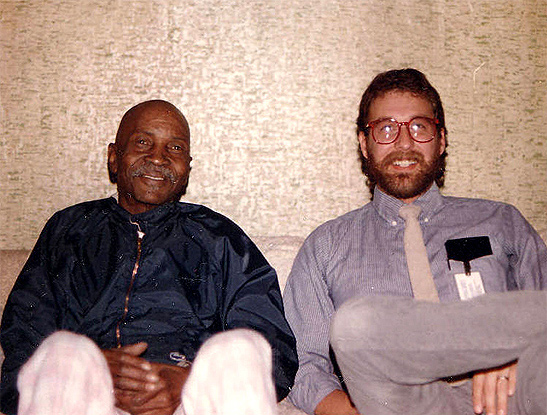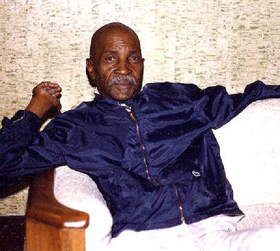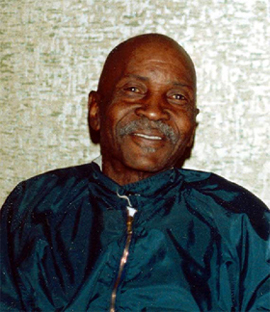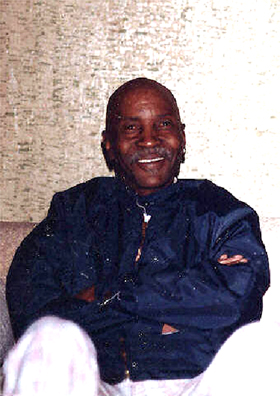 |
 |
|
 |

|
Remembering
Mr. Cleanhead
When looking back over a career that spanned almost six decades, I expect Eddie Vinson was always the exception to the norm. His incredible adaptability, switching back and forth between fluid mainstream jazz, big band swing, jump boogie and bebop, only to drop down and dig deep into traditional blues, was an artistry unto itself. Few have ever attempted it, yet alone mastered the skills required; fewer still with the virtuosity of the man they called, Mr. Cleanhead.
As we sat down to talk, Vinson told me music was his direction from the start. "That was the only thing I ever thought about, from a kid on up, you know? My dad was a piano player; my grandfather was a fiddle player, so it's been around me all the time."
Eddie's formative years as a saxophone player began outside a number of small Texas venues. "You'd pick up little bands, did little gigs, around the beer gardens down in Texas. You'd play out in front of the building on a platform to get the people to come in and drink beer. Play a little bit and let 'em dance. That was back in the thirties." It was during those early years that Eddie would first meet a man known simply as T-Bone. "I met T Bone Walker in 1935, way back there, yeah. Down in Dallas, we were playing at a club; he'd have his guitar and would come around. He was almost like an uncle to us. He was a little older, and would take care of us because we were from Houston. Still in high school, we'd take vacations and go up to the Dallas and Fort Worth area. But he was just like an uncle to us. He saw that we got our money and that nobody would cheat us, you know? He was one of those kinda' guys." Vinson would remain friends with T-Bone Walker for the remainder of his life. But T-Bone wasn't Eddie's only blues influence. "Leroy Carr was the first one I remember, you know, on records. Leroy Carr and Leadbelly. And all those people down in Texas. Lightnin' (Hopkins) lived three blocks from my house in Houston. In fact, we were just about ready to do some working together, just before he died. He was telling me, 'Why do you have to go over in Europe, man? You could work here and make more money and never have to go overseas.' I was just getting ready to go do that Texas thing down there with him." South Texas was rich with talent and local groups and territory bands were always looking for diamonds in the rough. Chester Boone was fronting one of the most popular in the area at that time, and Eddie jumped at the opportunity even before finishing high school. "I was primarily going in for the big band, for the jazz era, you know?"
It might have had something to do with his associations at the time, one in particular. Early in his career, Eddie would meet up with another sax player that would have a long-lasting impact on his style of play and love for jazz. That musician was 20 year old, Charlie Parker. As Vinson continued to hone his chops in the Chester Boone Orchestra, a trumpet player named Milt Larkin began to take notice of Eddie's versatility. When Larkin's fronted his own swing band, Eddie was recruited and immedidately found himself in the company of greatness. His band mates included Arnett Cobb, Illinois Jacquet and 'Wild Bill' Davis. The early 40's brought new opportunities and an introduction to 'real life' blues for Mr. Cleanhead. It was during one road trip that Eddie would meet and get to know one of his early influences; Big Bill Broonzy. It would become an invaluable learning experience. "I heard Big Bill Broonzy sing the blues back in the thirties, which really turned me on to it. Big Bill was just the one that really made me like the blues." Making the leap from jazz to blues seemed like a natural progression for young Eddie. It was while touring with Broonzy and Lil Green, that Eddie gained more confidence in his blues and vocal abilities. Vinson had become a triple threat. Already known as an accomplished jazz musician, critics and fans alike began to appreciate Cleanhead's bluer side and would grow to embrace him as one of America's premier blues shouters. Eddie Vinson's reputation preceded him, and the leader of one of the most popular bands of the day, took notice. Cootie Williams made Eddie an offer he couldn't refuse. "Oh yea, I left Houston to join his band in '42." Mr. Cleanhead's circle of friends, touring schedule, bank account and career would immediately shift into overdrive. "That's where I met Alberta Hunter; she was on the bill with the Cootie Williams Band at the Apollo Theatre. What we would call 'around the world,' Apollo Theatre, the Howard Theatre, and theatres in Philadelphia and Baltimore. We called that 'around the world.' When you made those four theatres, then you had enough money to pay your rent and everything."
During the war years, Vinson would rise to prominence as a vital and vocal part of the Cootie Williams Orchestra. The big band scored multiple chart hits; one of the biggest was Eddie singing on the Pete Johnson/Big Joe Turner classic, "Cherry Red." At the end of World War II, Eddie left Cootie Williams to step out and form his own group. Vinson's big band was an immediate success, producing multiple recording contracts and a number of nationwide popular hits like 'Old Maid Boogie' and 'Kidney Stew Blues.' By the early 1950's Eddie's band also featured a number of talented musicians, including an innovative and soon to be legendary saxophonist by the name of John Coltrane. Over his lifetime, Eddie wrote, recorded and toured the world with the Crème de la Crème of Jazz and Blues. As a premier session man, he was sought after as a guest artist and would tour the world many times over. "I would usually go as a soloist. There were so many European festivals; you have such good times over there with the guys. The guys from Chicago, Buddy Guy… Muddy's band. Pinetop got a band, we did a thing in Nice together with that band, and they back you up real good with blues." For those fortunate enough to have known Eddie "Cleanhead' Vinson, they also knew about his sense of humor, infectious laugh (more like a staccato hoot), and that elfish grin. So when the name John Lee Hooker was mentioned, "Oh yeah, of course. (Starting to laugh) That's my man! (Head back and hooting) The ladies, boy! (Hooting louder) The ladies just follow him, boy. Everywhere he go, all over France. (Calming a bit) He's a funny guy." Big Joe Turner was another lifelong friend of Eddie's. "He was one of the swellest guys I ever met, in my life. All the time, every morning, I'd get on the phone and call him up. He and I and T-Bone. Sometimes I'd get 'em fussin'. I'd tell T-Bone that Joe say he couldn't sing, and I'd go tell Joe that T-Bone say he couldn't sing. I'd go back and hide behind the curtain and they'd be fussin'. (Laughs with that glint in his eye) It was funny." That sense of humor reflected, and was well represented, in Cleanhead's blues. "There are so many different types of blues. All blues aren't sufferin' blues. I don't do sufferin' blues anyway. I'll sing some other peoples blues, but my thing, for me make sense a little bit, but they are more on a comical side." Eddie's comical side and onstage antics were often the highlight of any given performance. Whether he was playing along side Count Basie, Cannonball Adderley, Jay McShann or Johnny Otis; you knew Eddie Vinson was there for a good time. Johnny Otis started laughing when he remembered one appearance in Canada. "I don't think alcoholism is funny at all, (still laughing) it's tragic. In fact it contributed to Eddie leaving us prematurely. But some of the things he's done. (laughing) He and Joe Turner and T-Bone Walker were my featured artists on the show for a long time. Once in Montreal, I announced him, 'Ladies and Gentlemen, a great man of American Music. A person who transcends many lines… Rock and Roll, Rhythm and Blues, Swing, Jazz. The one and only, Mr. Eddie 'Cleanhead' Vinson.' And I look over at the spotlight and he's not there. And people are laughing. I'm saying to myself, 'they're laughing at me, because he hasn't shown up.' But, he was so intoxicated he couldn't walk. He was crawling and when he went by me, he gave me the salute. He got to the stool, and crawled up on the stool and I said, 'Oh my goodness.' He had the ability, no matter what his condition was, to sing and play. You'd never know; he wasn't impaired that way. I don't recommend it, and I'm not laughing because it's funny….but that surely happened." The Blues and the emotions they evoke are eternal, and
surround us all. They are truly a musical form that never seem to age.
Eddie reflected on their resurgence and their popularity. "I
imagine they (younger generation) want to get to the roots of
all your swing and your jazz. Actually, the roots are from the blues,
that's where your thing actually come from. I could even go back as
far as, say, spirituals. Blues and spirituals, I don't know which came
first." Still working into his 70's Eddie still loved playing
with and remembering his friends. One was Koko Taylor. "Oh yea,
we worked together quite a bit. She's a hard working lady. That lady
works awful hard and she's good. She's wonderful." Just prior to this interview, Etta James had just finished a live recording (a two album set) with Vinson, Red Holloway, Shuggie Otis and Jack McDuff at a small club in Los Angeles. When Eddie spoke you could see that he was still excited by the music, the recording and working with other musicians. "Yes. I gotta' little band I play with all the time, called a "Roomful of Blues," from Providence. In fact, I made an album with them. The first time I'd ever heard, I didn't think nobody could play the blues like that. Then I heard it and I said, 'Good God, look at these white boys playin' the blues like that.'"
An amazing career, the friends, the miles, the music; Eddie was philosophical about his motivation. "You got to like what you're doing. And the people, they like blues. I can play all the jazz I want, all night long, and the people just respond. And when you start singing the blues, they seem to enjoy it the most. I play a little jazz the first part of the night, and after you get a few drinks, you start playing the blues and everybody's having a good time." The one aspect I'll always remember about Eddie 'Cleanhead'
Vinson was his If you ever saw him perform, or were lucky enough to sit and talk, there was never any doubt that his message was aimed directly at you. Eddie Vinson left us about a year after we talked. The first news reports I heard, said that he died around three o'clock in the morning....if that's true it was probably the first time the Cleanhead ever did anything totally within character. The interview with Eddie Vinson took place in his
home on May 27, 1987. |
|
|
This site is designed and maintained by WYNK Marketing. Send all technical issues to: support@wynkmarketing.com

|





























